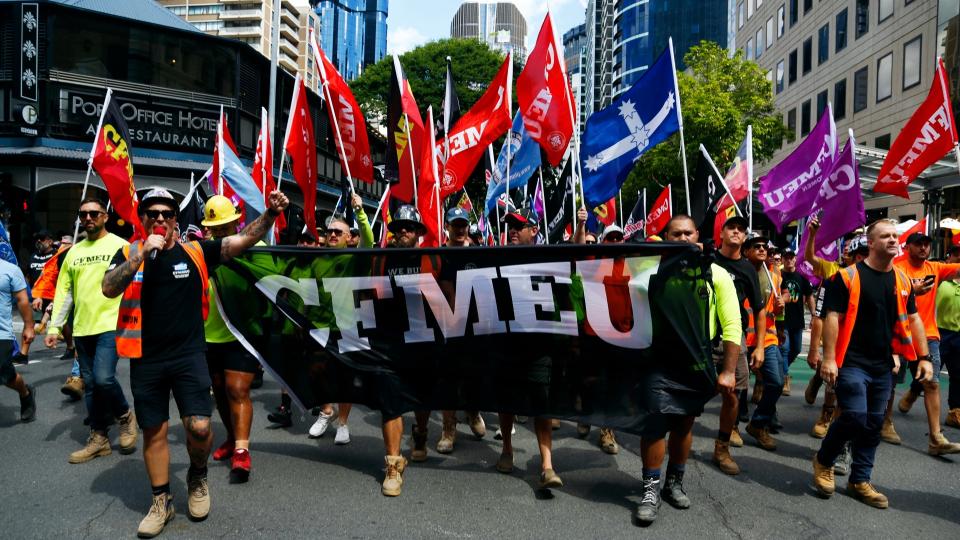For a fighting union movement, it needs to break with Labor

The Labor government’s response to unproven allegations of corruption in the construction division of the Construction, Forestry, Maritime Employees Union (CFMEU) has been to install external administrators into all branches other than Western Australia and the Australian Capital Territory. These administrators will have the power to remove workplace delegates and sack elected officials and organisers.
Tens of thousands of CFMEU members are being told they cannot decide for themselves how to run their union and fight for their rights.
This is an attack on workplace organising to reduce worker’s power in the construction industry. The consequences will be lives and livelihoods lost to the benefit of building companies’ profits.
This is only the latest example of how Labor politically corrupts the union movement.
As a result, unions fail to fight not just for workers’ more fundamental interest in challenging the capitalist system but, all too often, even for workers’ more immediate interests — for better pay and conditions, and safer workplaces.
In the last 40 years, Labor has been the federal government for half the time. Throughout that period, union membership has fallen as a proportion of the workforce from 50% to just 12.5% — the net effect being to weaken our class.
We need a fighting democratic union movement. This means members and delegates’ meetings directing industrial action and political campaigns, opposing state intervention and not subordinating union strategy to Labor’s pro-capitalist project.
The Labor Party constrains unions in two ways.
First, Labor governments use state power to restrict workers’ action. It was the Labor governments of Bob Hawke and Paul Keating, with the active support of the Australian Council of Trade Unions, that were instrumental in this historic weakening, starting with the Accord in 1983 and, in 1991, the shift from centralised wage fixing to enterprise bargaining.
As well as triggering a collapse in union density, these factors also undermined union militancy.
Furthermore, Labor governments have failed to fully reverse Coalition governments more far-reaching and direct attacks further criminalising industrial action.
The bosses can’t have it much better than Coalition governments prepared to push anti-worker laws, such as Work Choices (even if it costs them the election) safe in the knowledge that the “alternative” Labor capitalist government will leave most of it in place.
The ACTU is along for the ride with Labor, consistently subordinating workers’ interests to Labor’s electoral tactics.
ACTU Secretary Sally McManus raised hopes, earlier on, with talk about “breaking the rules”. But this was soon killed by the frost of Laborism.
You don’t become the ACTU Secretary without being committed to the boundaries set by Labor’s parliamentary leadership. In fact, it’s in the job description.
The effectiveness of unions squeezing some positive policy out of Labor governments should not be exaggerated.
Some new minimum standards regarding women’s rights in the workplace, industrial manslaughter and rampant job insecurity have been established under contemporary Labor administrations. But these have floated in on the rising tide of popular support, to which the unions have contributed only a part.
Significantly, recent changes to industrial law have not promoted the most fundamental of workers’ rights — the right to strike.
Secondly, Labor’s factional politics infests the unions to the great detriment of principled democratic unionism.
Many unions’ political “strategy” is tailored to the cesspit of Labor’s factional fights. It’s often the most right-wing union leaderships, such as that of the Shop Distributive and Allied Employees Association, that end up having the most to say about policies impacting workers’ lives.
The false pragmatism of reducing politics to trading influence within Labor means that even those unions that can mount serious industrial campaigns reduce their focus to getting concessions from Labor governments: these may be good for their own members, but they don’t necessarily lift up the working class as a whole.
The CFMEU and Electrical Trades Union in Queensland led campaigns to defend public ownership in the housing and power industries, where they have a significant concentration of membership.
The whole union movement should actively support public ownership, but that would run up against the last four decades in which Labor has pushed privatisation as much as the Liberals.
Adding dental care to Medicare ought to be a no-brainer, but Labor’s opposition has silenced unions.
Tying our unions to Labor is not smart pragmatism, but a strategic dead end and workers pay the price.
Independence from all pro-capitalist parties is needed to rebuild our unions: this would put the focus on workplace organising and popularising independent working-class politics.
Unions badly need a younger generation of workplace representatives and future union leaders, and an alignment with Labor radically reduces the ability of achieving that.
The views and the voting trends of “Gen Z” and “Millennials” are well-established and to the left of Labor.
A majority of young people support “socialism” and, as many if not more, are voting for the Greens or socialists, as they are for Labor.
It’s among them that many of the union activists of today and tomorrow will be found.
[Jonathan Strauss is a labour historian and Socialist Alliance member with decades of experience as a workplace representative, most recently as the NTEU James Cook University Branch President.]